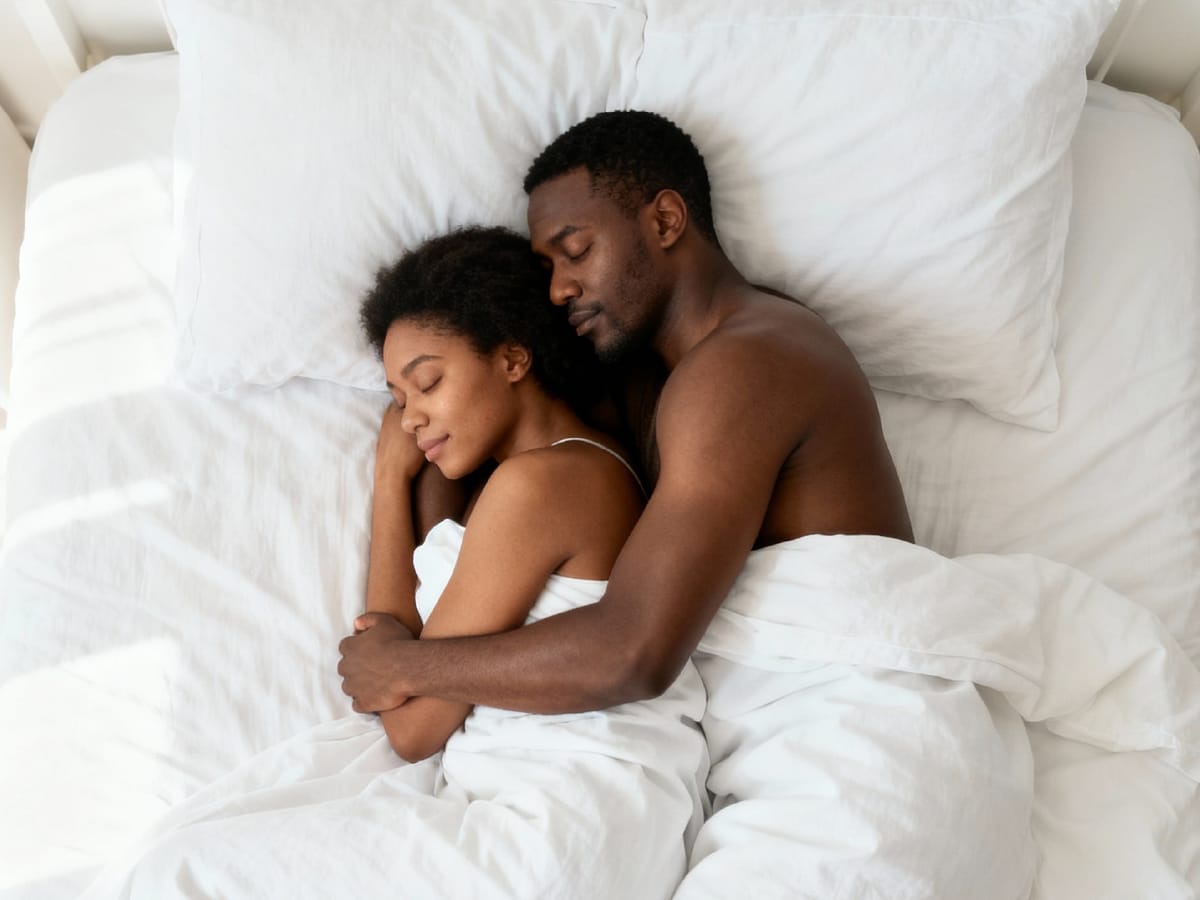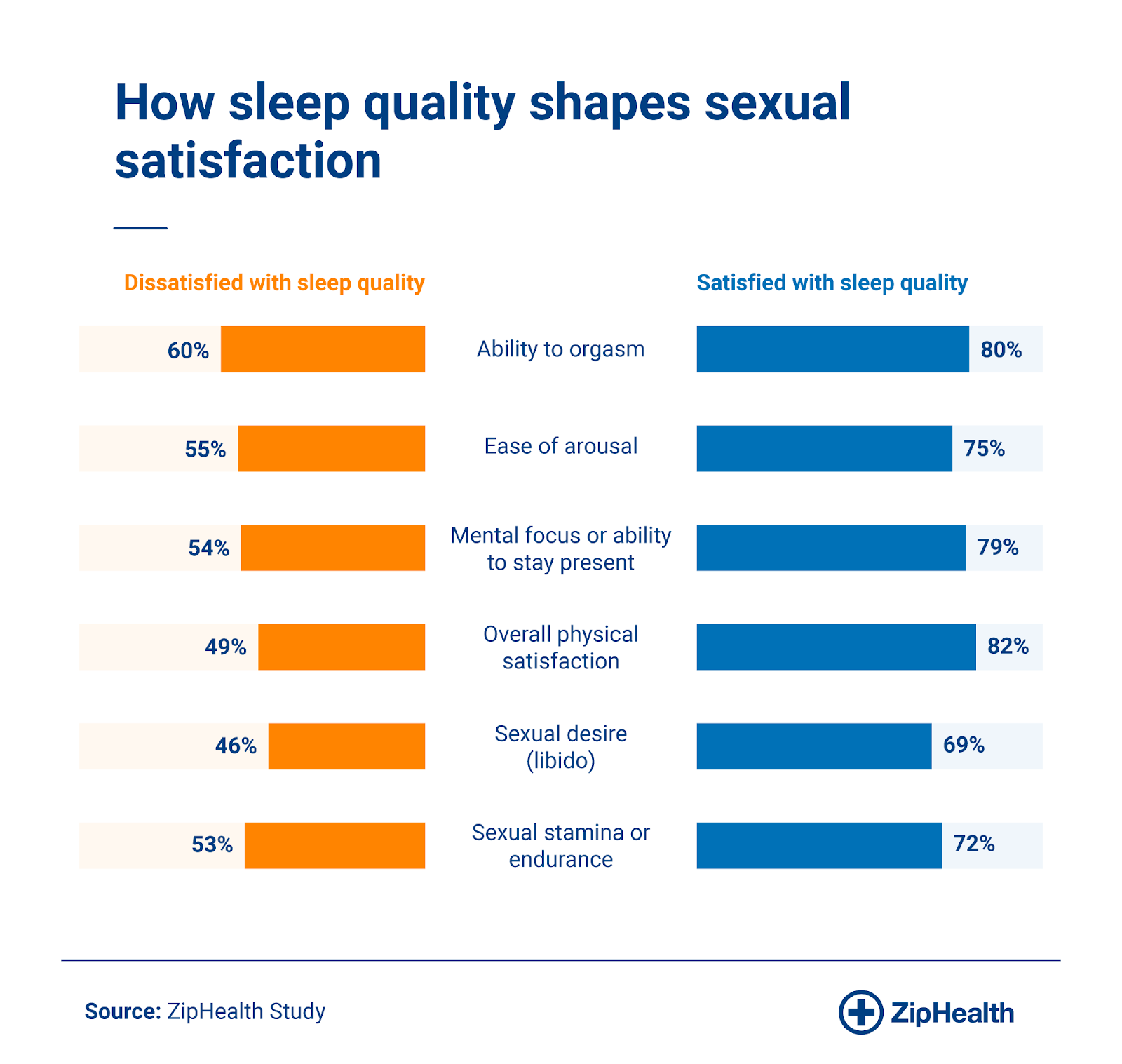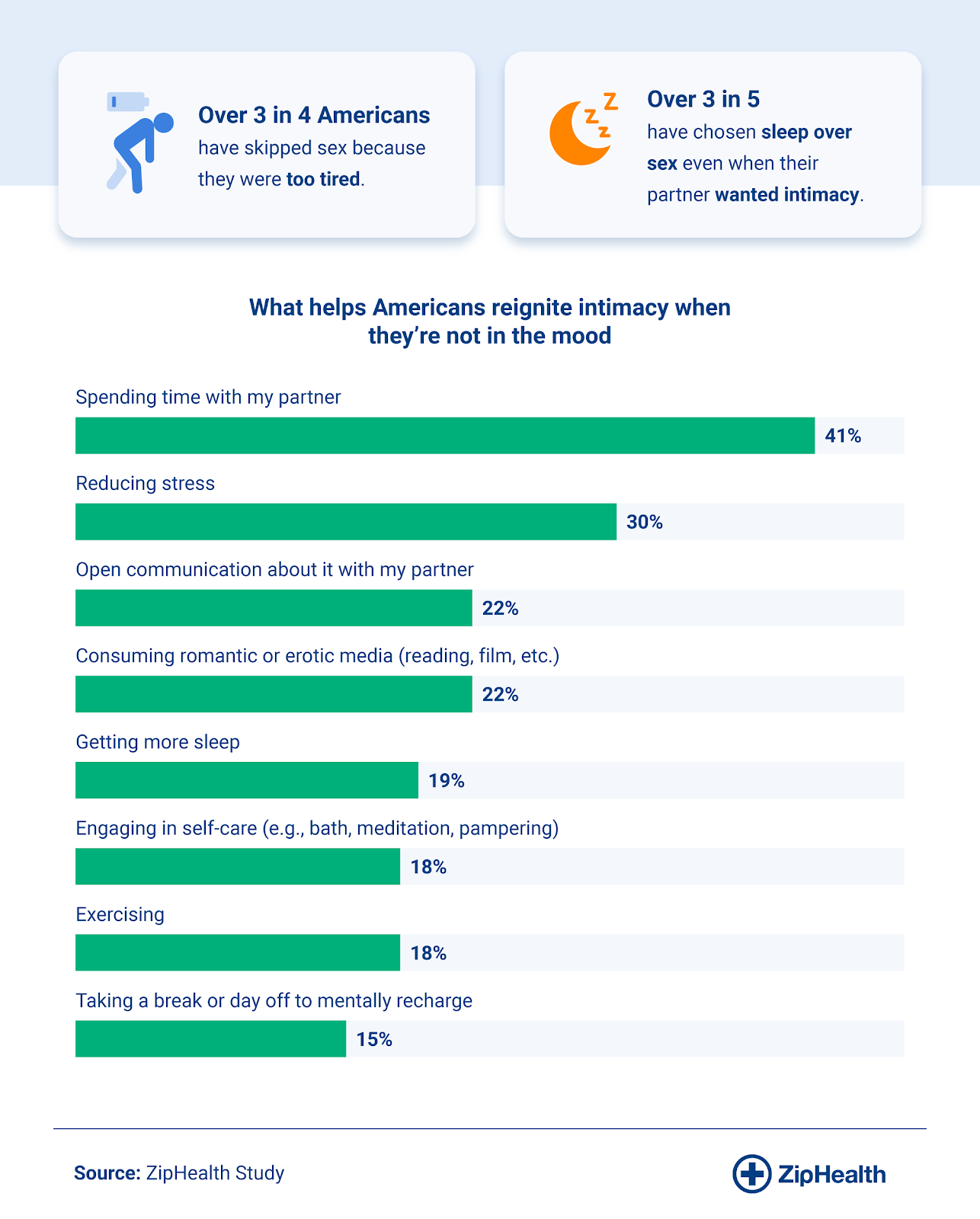The Sleep And Sex Connection: Does More Rest Mean Better Performance In The Bedroom?
Well-rested Americans report stronger sex lives. See how sleep quality shapes satisfaction, stamina, and desire.

Sleep and sex are two essential parts of our well-being, and it turns out, they might be more connected than you think. In a new study, ZipHealth surveyed 1,000 Americans to explore how rest affects everything from sexual satisfaction and stamina to desire and emotional connection.
The results? People who sleep better don't just feel more energized; they tend to feel more confident, more connected, and more fulfilled in the bedroom. Whether you're sleep-deprived or striving for better rest, these findings offer new insights into how your nightly habits might be shaping your intimate life.
Key Takeaways
- Americans satisfied with their sleep report significantly better sex lives, including higher physical satisfaction (82%), stronger focus (79%), and greater ease of arousal (75%) compared to those dissatisfied with their sleep.
- 90% of well-rested Americans feel emotionally connected to their partner, compared to 74% of poor sleepers.
- Over 3 in 4 Americans have skipped sex because they were too tired.
- Over 3 in 5 have chosen sleep over sex even when their partner wanted intimacy.
How sleep shapes satisfaction in the bedroom
Sleep isn't just for recovery, it might also be the secret to a more satisfying sex life. From physical response to focus and stamina, well-rested people report noticeable differences in how they experience intimacy.

Those who reported being satisfied with their sleep experienced significantly better physical satisfaction during sex (82%) compared to just 49% of those who were sleep-deprived. And when it comes to reaching orgasm, 80% of well-rested people said they were able to climax easily, versus 60% of poor sleepers.
Rest also appears to influence desire. Nearly 70% of sleep-satisfied individuals reported having a strong libido, while only 46% of dissatisfied sleepers said the same. Similar gaps showed up in stamina, with 72% of rested respondents reporting better endurance compared to just over half of those who lacked sleep (53%).
Mental presence played a role, too. Those who got better sleep were more likely to stay focused during sex (79% vs. 54%) and found it easier to become aroused (75% vs. 55%). These findings point to a clear theme: better sleep, better sex.
Common sleep issues among Americans
Many Americans struggle to get enough rest. One in three gets less than six hours of sleep on an average night, and older generations appear to be the most sleep-deprived. Forty-one percent of Gen Xers and baby boomers fall short, compared to 29% of millennials and just 24% of Gen Z.
Nearly half of Americans (49%) experience nighttime wake-ups, while many also report trouble falling asleep (39%) or staying asleep (38%). Irregular sleep schedules, loud snoring, and insomnia are common culprits. Only 17% of respondents said they had no sleep issues at all.
Even sleep setups can affect intimacy. One in four Americans said that sleeping separately from their partner hurt their sex life by making intimacy feel less spontaneous. These environmental and lifestyle factors may explain why some people struggle to feel fully present or satisfied in the bedroom.
Fatigue, feelings, and intimacy: What sleep reveals about connection
Physical satisfaction isn't the only thing tied to rest. Emotional intimacy is, too. Well-rested individuals reported feeling more in sync with their partners, both emotionally and sexually, and more confident overall in the bedroom.

In fact, 90% of those who sleep well said they feel emotionally connected to their partner, compared to 74% of poor sleepers. The confidence gap was just as wide. 85% of sleep-satisfied people felt confident in their sexual performance, versus only 60% of those who were dissatisfied with their sleep.
Rest also affects how comfortable people feel during sex. Eighty-two percent of those who slept well said they felt relaxed and not self-conscious in intimate moments. But for poor sleepers, that number dropped sharply to 51%.
Syncing up with a partner may be easier when both people are well-rested. Nearly three-quarters (74%) of those satisfied with their sleep said they and their partner were sexually in sync, a big difference from the 47% of poor sleepers who felt the same. Overall intimacy followed a similar pattern, with 79% of well-rested individuals reporting satisfaction in this area, compared to only 13% of poor sleepers.
But even with strong connections, fatigue remains a major barrier to intimacy. More than three in four Americans admitted to skipping sex because they were simply too tired. This trend was consistent across Gen Z, millennials, and Gen X. Gen Z was the most likely to prioritize sleep over sex (66%), followed by millennials (62%) and Gen X and boomers (59%).
When asked what helps reignite intimacy when they're not in the mood, Americans pointed to emotional closeness over quick fixes. Spending time with a partner topped the list (41%), followed by reducing stress (30%) and engaging in open communication or with romantic media (both at 22%). Only 19% cited getting more sleep as a solution.
While orgasm can help some people relax, it isn't essential for most. Fewer than one in five Americans said they needed to orgasm to fall asleep or sleep well. But this varied by age and gender. Gen Z (23%) was most likely to link sex and sleep, while just 16% of Gen Xers and boomers felt the same. Men were more than twice as likely as women to say they needed orgasm to sleep, 24% vs. 11%.
How Americans try to improve their sleep quality
For those hoping to get better sleep, consider the steps that many are already taking. Nearly half (49%) avoid caffeine before bed, while others try to maintain a consistent bedtime (40%) or use blackout curtains, white noise, or temperature control (38%).
Some avoid late-night snacks (28%), practice relaxation techniques (27%), or reduce screen time (25%). Others turn to melatonin or sleep aids (23%) or limit alcohol (15%). Only a small portion uses sleep trackers (10%) or blue light blocking glasses (5%).
Why better sleep might be the key to better sex
The connection between sleep and sex runs deeper than many realize. Those who get enough rest are more likely to feel confident, connected, and satisfied in their intimate lives, while sleep-deprived individuals may face challenges with arousal, stamina, and emotional closeness.
Prioritizing sleep isn't just good for your health. It might be one of the most overlooked ways to boost your relationship and your confidence in the bedroom.
Methodology
We surveyed 1,000 Americans to explore how sleep quantity and quality impact sexual satisfaction, stamina, and desire. The average age was 42; 43% were male, 56% were female, and 1% were non-binary. Generationally, 38% were baby boomers and Gen X combined, 47% were millennials, and 15% were Gen Z.
About ZipHealth
With ZipHealth, you can access discreet online health consultations and treatments for various conditions, including medications like Viagra and Sildenafil. We strive to provide accessible and convenient health care, ensuring you can manage your health comfortably and privately.
Fair Use Statement
This article is for informational purposes only. If you'd like to share these findings for noncommercial use, please include proper attribution with a link to ZipHealth.
